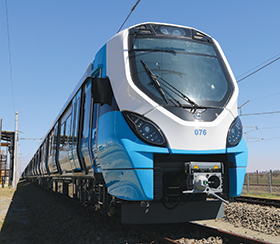

It is important that commuter trains waste as little time as possible when leaving platforms, not only to save passengers time when travelling from station to station, but also to allow for trains to arrive at the station in quick succession, especially during peak periods.
In order to allow this, the motor that drives the train must be designed to provide high torque at low speed for fast acceleration from the platform, while displaying low torque once the train is running at high speed. Gibela uses traction motors – electric motors that do just this – in its passenger trains. These specially-designed traction motors are now being locally produced by Gibela.
“Gibela’s trains use an electric multiple unit or EMU. This implies that each carriage or car is self-propelled and does not need a separate locomotive to pull the coaches. The four middle cars are propelled each with four separate traction motors. The 16 motors work in unison to ensure a fast but smooth, departure for commuters,” says Dr Buyiswa Mncono-Liwani, corporate services and traction motors operation executive at Gibela. “The train is also made from lightweight stainless steel to further assist with this rapid acceleration, while being energy efficient.”
Traction motors can be self-cooled, while exhibiting easy speed control with high motor efficiencies. Furthermore, the traction motor has low maintenance and running costs. The Gibela traction motors are manufactured to stringent tolerances in order to last 40 years. Mncono-Liwani explains that longevity is essential, because motors are the most expensive part of the train to replace. “To change a faulty motor, one needs to decouple the gangways and lift the chassis of the car in order to detach the bogie to gain access to the motor. Most other subsystems can be removed with a forklift or crane from beneath or top of the train.”
Gibela’s passenger trains are designed specifically for South Africa’s gauge tracks. “From the mid-19th century, the 1067 m Cape gauge rail track became widespread in the British Empire. This was selected in South Africa to reduce the cost of building tracks across and through the mountains found in several parts of the country and is still the predominant gauge in South Africa,” explains Mncono-Liwani.
To take advantage of high speed and axle load, most countries (55% of the lines in the world) have adopted the wider 1435 m standard gauge and a universal traction motor can be used on such tracks. The width of the Cape gauge tracks do not allow for use of a universal traction motor. The Gibela traction motor had to be specifically designed to overcome the width constraints of South Africa’s tracks and still provide the same power characteristics as a universal traction motor. “The same effective torque profile was achieved by designing a very narrow motor with a larger circumference,” says Mncono-Liwani.
Engineers are trained as generalists and it has been several decades since train design – a specialist field – last took place in South Africa. To ensure that they are equipped with the requisite skills to build trains in the country, Gibela sent its team of local engineers to various European and South American sites to work directly with the design teams at those locations and to participate in the design process to get hands-on experience.These engineers learnt the generic stage-gate development process, a strategic approach guiding innovation in design and developed the specific train design now being manufactured at Gibela’s plant at Dunnottar in Nigel, Gauteng – where there is now also a dedicated traction motor workshop.
The engineering team is responsible for incremental design improvements to Gibela’s passenger trains, which are implemented at intervals known as ‘baselines’. Initially imported systems or components are used and these then undergo a baseline change when a locally supplied system replaces the imported system.
Gibela was formed in 2013 as a black economic empowerment company. The Gibela Rail Transport Consortium is a venture between French rail company Alstom and South Africa’s Ubumbano Rail. Gibela has a R51 billion contract with the South African government to manufacture 600 trains for PRASA. The scope of the contract includes train maintenance, technical support and the manufacture and supply of spare parts.
Today, state-of-the-art commuter trains are rolling off the production line at Gibela’s bespoke R1 billion Ekurhuleni factory. In fulfilment of contractual obligations to PRASA, Gibela is training thousands of historically disadvantaged South Africans – mainly women – in technical skills for both Gibela and the manufacturing industry at large.

© Technews Publishing (Pty) Ltd | All Rights Reserved